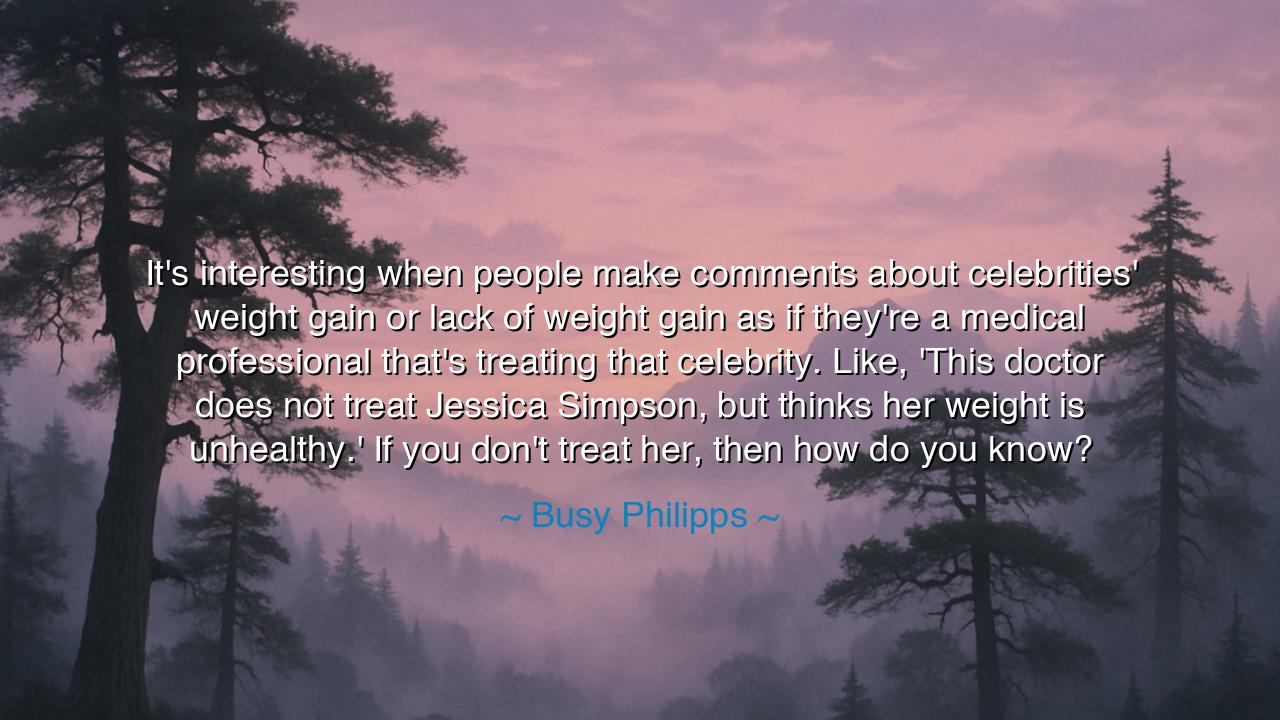
It's interesting when people make comments about celebrities'
It's interesting when people make comments about celebrities' weight gain or lack of weight gain as if they're a medical professional that's treating that celebrity. Like, 'This doctor does not treat Jessica Simpson, but thinks her weight is unhealthy.' If you don't treat her, then how do you know?






Hear the words of Busy Philipps, who spoke with candor and indignation: “It’s interesting when people make comments about celebrities’ weight gain or lack of weight gain as if they’re a medical professional that’s treating that celebrity. Like, ‘This doctor does not treat Jessica Simpson, but thinks her weight is unhealthy.’ If you don’t treat her, then how do you know?” In this fiery declaration, there resounds a defense of truth, dignity, and humility. She reveals the folly of a culture that assumes the right to judge bodies it does not understand, and the arrogance of speaking as though one’s opinion were medical fact.
The meaning of her words cuts deep. Philipps calls out the presumption of those who cloak gossip in the language of expertise. To comment on the weight of another, especially in public, without knowledge of their health, their struggles, or their circumstances, is not wisdom but arrogance. To speak as if one were a medical professional without being so is to practice deceit, lending authority to judgment that has no rightful foundation. Her challenge—“If you don’t treat her, then how do you know?”—is a thunderclap, demanding humility where hubris has reigned.
The origin of this truth lies in the culture of celebrity, where public figures are dissected and judged as though their bodies were communal property. In this realm, Jessica Simpson became one example among many, her body subjected to commentary from strangers and critics who pretended to know what was “healthy” or “unhealthy.” Philipps, herself an actress, spoke from within this fire, exposing the cruelty of a society that confuses spectacle for medicine and judgment for care. Her words arise from lived experience: she knows the sting of such false authority, and she names it for what it is.
History, too, has seen such arrogance. Consider the plight of Mary Shelley, the creator of Frankenstein, who was judged harshly by her contemporaries for her choices, her body, and her role as a woman writer. Critics spoke not as companions or healers, but as if they had the right to dissect her personhood as they did her prose. Their judgments masqueraded as insight, but they were no more than prejudice in the guise of knowledge. This mirrors the same pattern Philipps denounces: those unqualified to judge claim authority they do not possess, and in doing so, wound the dignity of others.
The emotional power of Philipps’ words lies in her fierce defense of privacy and truth. To claim knowledge of another’s health without treating them is to violate the sacred boundary between person and healer, between private struggle and public gaze. She strips bare the arrogance of a society too quick to speak and too slow to understand. Her words remind us that every body carries its own hidden story, and that respect begins in silence, in listening, in acknowledging what we do not and cannot know.
The lesson for us is timeless: resist the temptation to speak as though you know the battles others face. Recognize the limits of your knowledge, and do not grant yourself the authority that belongs only to those who walk beside another in care and compassion. To judge a body without knowledge is to spread harm; to withhold judgment is to preserve dignity. Let your words be few, and let them build rather than wound.
Therefore, let your actions reflect this wisdom. When you see another—celebrity or neighbor—whose body changes, resist the urge to comment. Instead, practice respect and humility. Teach yourself and your children that health is not measured by glances, nor worth by size, and that only true healers have the right to speak of health. In doing so, you break the chain of casual cruelty and help build a culture where dignity is stronger than gossip.
And so, remember the teaching of Busy Philipps: “If you don’t treat her, then how do you know?” In those words lies a shield against arrogance and a call to humility. Speak not as if you are a doctor when you are not; speak as a human being who honors the mysteries of another’s life. For in silence, in respect, and in compassion, we honor not only others, but ourselves.






AAdministratorAdministrator
Welcome, honored guests. Please leave a comment, we will respond soon